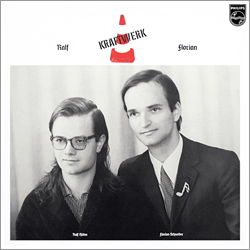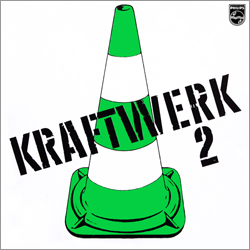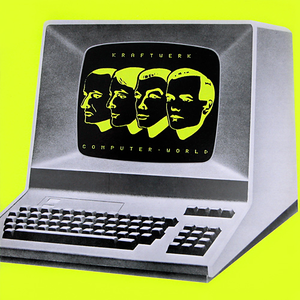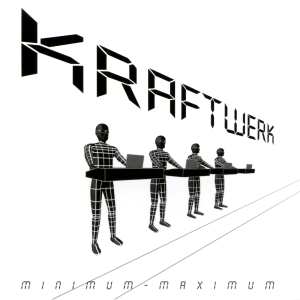
Kraftwerk is a German electronic band formed in Düsseldorf in 1970 by Ralf Hütter and Florian Schneider. Widely considered innovators and pioneers of electronic music, Kraftwerk were among the first successful acts to popularize the genre. The group began as part of West Germany's experimental krautrock scene in the early 1970s before fully embracing electronic instrumentation, including synthesizers, drum machines, and vocoders. Wolfgang Flür joined the band in 1974 and Karl Bartos in 1975, expanding the band to a quartet.

Autobahn is the fourth studio album by German electronic music band Kraftwerk, released in November 1974 by Philips Records. The album marked several personnel changes in the band, which was initially a duo consisting of Florian Schneider and Ralf Hütter; later, the group added Klaus Röder on guitar and flute, and Wolfgang Flür on percussion. The album also completed the group's transition from the experimental krautrock style of their earlier work to an electronic pop sound consisting mostly of synthesizers and drum machines. Recording started at the group's own Kling Klang facility, but was predominantly made at Conny Plank's studio. Autobahn also includes lyrics and a new look for the group that was suggested by Emil Schult, an associate of Schneider and Hütter.
Organisation zur Verwirklichung gemeinsamer Musikkonzepte was an experimental krautrock band, that was the immediate predecessor of the band Kraftwerk. In addition to the founding members of Kraftwerk, Ralf Hütter and Florian Schneider-Esleben, Organisation included Basil Hammoudi, Butch Hauf, and Fred Monicks. The band was assisted by Paul Lorenz, Peter Martini, and Charly Weiss during their career.

Ralf und Florian is the third studio album by the German electronic band Kraftwerk. It was released in October 1973 on Philips. It saw the group moving toward their signature electronic sound. It was 160# on the US Top 200 Albums Chart in 1975.

Kraftwerk 2 is the second studio album by German electronic band Kraftwerk, released in January 1972.

Radio-Activity is the fifth studio album by German electronic music band Kraftwerk, released in October 1975. The band's first entirely electronic album is also a concept album organized around the themes of radioactive decay and radio communication. All releases of the album were bilingual, with lyrics in both English and German. The album was accompanied by single release of the title track, which was successful in France and Belgium.

The Man-Machine is the seventh studio album by German electronic music band Kraftwerk. It was released on May 1978 by Kling Klang in Germany and by Capitol Records elsewhere. A further refinement of their mechanical style, the album saw the group incorporate more danceable rhythms. The album has a satirical bent to it. It is thought to address a wide-range of themes from the Cold War, Germany's fascination with manufacturing, and humankind's increasingly symbiotic relationship with machines. It includes the singles "The Model" and "The Robots".

Computer World is the eighth studio album by German electronic band Kraftwerk, released on 11 May 1981.

The Mix is the tenth studio album by the German electronic music band Kraftwerk. It was released on 11 June 1991 by Kling Klang and EMI in Europe and by Elektra Records in North America. It has entirely re-arranged and re-recorded versions of a selection of songs which had originally appeared on Kraftwerk's albums Autobahn (1974) to Electric Café (1986). Some of the songs, such as "The Robots" and "Radioactivity", have new additional melodies and/or lyrics.

Tone Float is the only LP by the German band Organisation zur Verwirklichung gemeinsamer Musikkonzepte (Organisation.) Organisation was a predecessor to Kraftwerk, which was formed by two members of the band, Ralf Hütter and Florian Schneider-Esleben, after the album's release.

Florian Schneider-Esleben was a German musician. He is best known as one of the founding members and leaders of the electronic band Kraftwerk, performing his role with the band until his departure in 2008.

Neu! were a West German krautrock band formed in Düsseldorf in 1971 by Klaus Dinger and Michael Rother following their departure from Kraftwerk. The group's albums were produced by Conny Plank, who has been regarded as the group's "hidden member". They released three albums in their initial incarnation—Neu! (1972), Neu! 2 (1973), and Neu! 75 (1975)—before disbanding in 1975. They briefly reunited in the mid-1980s.

Neu! is the debut album by German krautrock band Neu!. It was released in 1972 by Brain Records. It was the first album recorded by the duo of Michael Rother and Klaus Dinger after leaving Kraftwerk in 1971. They continued to work with producer Konrad "Conny" Plank, who had also worked on the Kraftwerk recording sessions.

Wolfgang Flür is a German musician, best known for playing percussion in the electronic group Kraftwerk from 1973 to 1987. Flür claims that he invented the electric drums the group used throughout the 1970s. However, patent records dispute this, citing Florian Schneider and Ralf Hütter as the creators.

Minimum-Maximum is the first official live album release by Kraftwerk, released in June 2005, almost 35 years after the group gave its first live performance. The album features two CDs of tracks recorded on the group's world tour during 2004, including concerts in Warsaw, Ljubljana, Moscow, Berlin, London, Budapest, Tallinn, Riga, Tokyo, and San Francisco.

Michael Rother is a German experimental musician, best known for being a founding member of the influential bands Neu! and Harmonia, and an early member of the band Kraftwerk.

"Autobahn" is a 1974 song by German electronic band Kraftwerk, being the second and lead single from their studio album of the same name. The song was composed by Ralf Hütter and Florian Schneider of the band, with Emil Schult collaborating on the lyrics. It was co-produced by Conny Plank, and is the band's first track to use sung lyrics. Recorded in 1974, the song is designed to capture the feel of driving on a motorway. "Autobahn" is Kraftwerk's biggest hit in the US, reaching number 25 on the Billboard Hot 100.

Exceller 8 is the title of a 1975 compilation album of music by Kraftwerk. It was released by the Vertigo label in order to capitalize on both the summer chart success of the single "Autobahn" and the imminent release of the next Kraftwerk album Radio-Activity. By this time, Ralf Hütter and Florian Schneider had set up their own record and publishing company, Kling Klang.

Klaus Dinger was a German musician and songwriter most famous for his contributions to the seminal krautrock band Neu!. He was also the guitarist and chief songwriter of new wave group La Düsseldorf and briefly the percussionist of Kraftwerk.
Bureau B is an independent record label, music publisher and booking agency from Hamburg, Germany, founded in 2005 by Gunther Buskies as a sister label to Tapete Records. The label releases varieties of electronic, free-spirited music, with the spectrum ranging from pop to avant-garde. The label has amassed an extensive catalogue of reissues and new productions, including classics from the genre of electronic music in the 1970s and early 1980s popularly classified as Krautrock, alongside new recordings by such formative artists as Faust, Kreidler, Roedelius, Tietchens, Moebius.


















